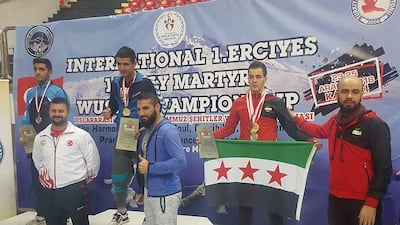One was an Olympic bronze medallist boxer. Another was a world champion in freestyle wrestling. These Syrians are two of the 581 sportsmen and women to have been killed or severely injured between the start of the uprising in March 2011 and the end of 2014, according to figures from the UK-based Syrian Network for Human Rights. Most died in government air strikes or other military operations but some fell victim to ISIL violence. It is likely that many more been killed or severely injured since.
The war has taken a heavy toll on every aspect of Syrian society, including sport. Aerial bombardment and shelling have destroyed stadiums and other sports facilities, and even athletes who escaped physical harm in the fighting have been targeted in other ways.
Before the war, Maeser Mahmoud, 30, was a member of Syria’s champion water polo team and the coach of the Deir Ezzour water polo team. But after the uprising began he stopped entering his team in government-organised tournaments because of his opposition to the regime.
“I was later called to the Sports Union headquarters [a government body] and threatened with detention if I went against their will by not letting the athletes participate,” says Mahmoud whose passport was also seized by the government, preventing him from taking part in international tournaments.
“Things were systematically going against those who refused to praise the government even if they were champions. It didn’t make them immune to harassment, arrest, and in some cases being killed,” he adds.
After being threatened with detention, Mahmoud decided to stop playing water polo and quit his coaching job to become a sports teacher at a local school in Deir Ezzour.
___________________________________
• Syrian refugee swam to freedom – now she's in the Olympics
When the overloaded dinghy taking Yusra Mardini and 22 other Syrian refugees to Greece started to sink, the teenager, her sister Sara and another woman jumped into the freezing Aegean Sea and for more than three hours kept the boat afloat, hauling it through the water until they reached land. Their actions saved 19 other lives as well as their own.
___________________________________
He is not the only sports star to have been targeted by the authorities. According to the Syrian Network for Human Rights, others have been detained by the government. Some have been tortured. The most high-profile victim is Syrian and Arab chess champion Dr Rania Mohammad Abbasi, who was arrested by the Syian authorities in March 2013 along with her husband, Abdul Rahman Yasin, and their six children, aged five to 17. The whole family remains in custody, their whereabouts unknown.
In March 2012, Syrian opposition groups established the Free Syrian Body of Sports with a mission to bring together athletes who had broken away from the regime and to document abuses carried out against them. The organisation, which is based in Gaziantep, Turkey and later won the backing of the Syrian National Coalition, the main opposition grouping at the time, was intended to be recognised by world sporting organisations as a substitute for the Syrian government’s Sports Union.
The Free Syrian Body of Sports receives no outside funding, however, and as its executive chairman, Orwa Kanawati, tells The National, fulfilling its mission has been an uphill struggle.
“The air raids destroyed most of the sports facilities in the country, and we lost dozens of champions and athletes by arbitrary detention over the last few years,” he says. “Today any sportsperson who opposes the regime will lose his identification and documents. Even their passports will be taken away from them.”
But against all odds, Syrian athletes affiliated to the Free Syrian Body of Sports have racked up some extraordinary achievements during the war. The most significant of these are the gold and bronze medals won by karate players Ali Baroudi and Elham Abdel Ghafour respectively at the Athens Open 2013 international karate tournament.
Last year, a Wushu Kung Fu team backed by the Free Syrian Body of Sports won a string of medals in international tournaments. In December the team came third overall out of six countries competing in the Kayseri International Championship in Turkey.
“What we are trying to do here is to normalise life as much as possible for athletes. Giving up to the war is not at all on our agenda,” says Mr Kanawati. Rather, the Free Syrian Body of Sports aims to “tell the world that we’re still here, this is our identity, and we are not terrorists!”.
Mahmoud is also optimistic despite being forced to give up his career and, later, his home. In December 2014 he left Syria, with the help of smugglers. He now lives in the Turkish border town of Gaziantep and is currently in training for future international tournaments where he will compete with backing from the Free Syrian Body of Sports.
“Despite the difficulties we’ve faced, we’re still going steadily through it all with the determination of all the people [who have] detached themselves from the Syrian regime for good,” he says.
“Giving up hope at this point is unthinkable for us athletes.”
foreign.desk@thenational.ae

